 Illustrations: Catarina BessellEven now, after an Argentine pope has been appointed, Brazilians still believe that their country is very well positioned on the international plane and doesn’t need the throne of St. Peter to project its influence: 85% say that Brazil has been able on its own to establish an image of independence vis à vis the rest of the world. Indeed, the very fact that the new pope comes from a neighboring nation makes little impression, since fewer than 20% of Brazilians think of themselves as Latin Americans or South Americans. And although spiritual aspects are admirable, what 85% of Brazilians are really excited about are the economic results of globalization and the effects of freer trade.
Illustrations: Catarina BessellEven now, after an Argentine pope has been appointed, Brazilians still believe that their country is very well positioned on the international plane and doesn’t need the throne of St. Peter to project its influence: 85% say that Brazil has been able on its own to establish an image of independence vis à vis the rest of the world. Indeed, the very fact that the new pope comes from a neighboring nation makes little impression, since fewer than 20% of Brazilians think of themselves as Latin Americans or South Americans. And although spiritual aspects are admirable, what 85% of Brazilians are really excited about are the economic results of globalization and the effects of freer trade.
These are the results of a survey entitled Brazil, the Americas and the World: foreign policy and public opinion 2010, coordinated by Professor Maria Hermínia Tavares de Almeida, working with a team from the Institute of International Relations at the University of São Paulo (IRI-USP). Professors Janine Onuki and Leandro Piquet Carneiro were also members of the team, which was financed by FAPESP. According to the study, national interest in foreign policy is growing steadily, a finding that contrasts with past consensuses. “You can no longer speak of an alleged indifference on the part of leaders and the general public and, although the Ministry of External Relations continues to occupy a central position at the helm of Brazil’s foreign policy, it would be a mistake to continue to think that Itamaraty, as the ministry is known, is a successful case of bureaucratic insularism,” the researcher explains. The survey is part of a collaborative project entitled The Americas and the World, captained by researchers from the Center for Economic Research and Teaching (Cide – Mexico) that is looking at several Latin American countries in order to examine the connection between public opinion and the most important topics of foreign policy and international relations.
“This study is a response to the growing need for information in an area that is of strategic importance for the development and stability of countries in the region and where, in general, the data is dispersed and not very reliable. In a democratic context, decision makers need to have information about what the citizens are thinking in order to design their foreign policies,” says Guadalupe González González, director general of the Cide project. “Brazil, in the new world scenario, has increased its clout both within and outside the region, positioning itself as the Latin American liaison with the BRICS group of emerging economies (Brazil, Russia, India, China, and South Africa) and the leading promoter of both South-South cooperation and South American integration,” the researcher observes. She believes that Brazil and Mexico appear to be the potential leaders of the Latin American region.
 Within this new context, Tavares de Almeida believes that when government policy thinks about Brazil and the world, it can no longer depend only on the skills and discipline of a bureaucratic elite like that of Itamaraty, but must also consider the consensus about the world and Brazil’s place in it as seen by a community that is more involved than ever before in the political discussion. Despite the increase in the number of persons interested in discussions of international issues, a group the researchers refer to as the “interested and informed public” (PII), the active role in contributing ideas is played by the so-called “foreign policy community” (CPE). There is a big gap between the interest of its members (91%) when compared with the PII (22%).
Within this new context, Tavares de Almeida believes that when government policy thinks about Brazil and the world, it can no longer depend only on the skills and discipline of a bureaucratic elite like that of Itamaraty, but must also consider the consensus about the world and Brazil’s place in it as seen by a community that is more involved than ever before in the political discussion. Despite the increase in the number of persons interested in discussions of international issues, a group the researchers refer to as the “interested and informed public” (PII), the active role in contributing ideas is played by the so-called “foreign policy community” (CPE). There is a big gap between the interest of its members (91%) when compared with the PII (22%).
Among the “ordinary” public, the survey questions involved answers of “little” and “no” interest, respectively, by 25% and 20% of respondents. This stems largely from the general public’s infrequent contact with the rest of the world: 88% have never left the country. In the case of the Brazilian sample within the larger Latin America survey, 200 political and social leaders were interviewed, plus a random sample of 2,400 people representative of Brazil’s urban population, between the end of 2010 and 2011. The team plans to repeat the survey in 2014 in order to compare the results.
“No one had conducted a survey of the public until then. What is new is the revelation that we can no longer talk about a foreign policy that is isolated in the Ministry of External Relations (MRE) or the Office of the President. The fact that international relations have no electoral impact does not mean that they are not important to people and are not a subject of discussion,” Tavares de Almeida says. But she warns that the results show perceptions, not necessarily truths. “We need only consider the exaggerated enthusiasm about Brazil’s role in the world or the view that developed countries are not going to be important in the future, both of which are somewhat exaggerated predictions made by emerging countries,” she notes.
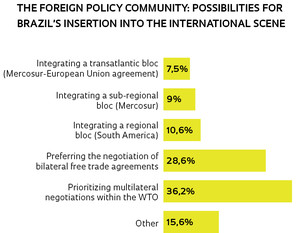 Proof of this is the comparison between the data obtained in this recent study and that obtained by the late political scientist Amaury de Souza (who died in 2012), in both versions of his research entitled Brazil in the region and the world: perceptions of the Brazilian foreign policy community that he conducted for the Brazilian Center for International Relations (Cebri) in 2001 and 2008.
Proof of this is the comparison between the data obtained in this recent study and that obtained by the late political scientist Amaury de Souza (who died in 2012), in both versions of his research entitled Brazil in the region and the world: perceptions of the Brazilian foreign policy community that he conducted for the Brazilian Center for International Relations (Cebri) in 2001 and 2008.
To convey an idea of how the perception of the CPE has changed, in 2001, 74% believed that Brazil’s international role would grow in ten years; in 2008, that percentage climbed to 85%. Now we see that in 2010, optimism had reached 97%. This optimism also extends to the international scene as a whole. “Optimism increases with information about and interest in world issues. That is why the CPE shows such a high degree of satisfaction, 85%, with Brazil’s ability to act autonomously on the international scene,” the author notes. But among the disinterested and uninformed public, that satisfaction falls to 37%.
Another figure that caught the attention of the researcher: fewer than 15% of the respondents from the foreign policy community and the informed public believe that the United States will be more important in the future. The overwhelming majority says that the future will belong to China, Brazil, and India. “Of course they were already anticipating a world in which power is more decentralized, but I expected, at least from the CPE, more differences of opinion,” Tavares de Almeida observes.
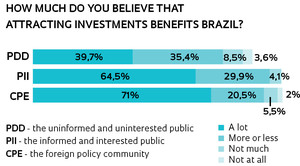 Another finding that the researcher found noteworthy is the existence of a consensus between the foreign policy community and the interested and informed public. In the surveys by Amaury de Souza conducted in 2001 and 2008, the United States was still seen by 49% of the respondents from the foreign policy community as a respectable global actor for the following decade, a percentage that fell to 15% in 2008 and remained the same in 2010. Other influential countries, such as Germany, Russia, and Japan also lost clout as nations that were important for Brazil, according to the community’s perception.
Another finding that the researcher found noteworthy is the existence of a consensus between the foreign policy community and the interested and informed public. In the surveys by Amaury de Souza conducted in 2001 and 2008, the United States was still seen by 49% of the respondents from the foreign policy community as a respectable global actor for the following decade, a percentage that fell to 15% in 2008 and remained the same in 2010. Other influential countries, such as Germany, Russia, and Japan also lost clout as nations that were important for Brazil, according to the community’s perception.
The 30% drop with respect to the United States, despite the recent financial crises, according to Tavares de Almeida, reveals a rather unrealistic perception of international relations and the role that the U.S. and its western allies will continue to play for a long time to come. Furthermore, the U.S. provokes complicated attitudes and feelings of both admiration and mistrust among all the groups of respondents. Although admiration for the Americans is higher among members of the CPE than among other sectors of the public, an important number of members of the foreign policy community dislikes the United States.
“There seems to be a deeply-rooted anti-Americanism among Brazilians and the data show that it is inversely proportional to their interest, knowledge, and involvement in international issues,” Tavares de Almeida notes. While Brazil attempts to develop closer relations with the U.S., the foreign policy community, contrary to what one might expect, still has reservations. Actually, the insularity of Brazil’s foreign policy has been declining. “Since the 1990s, there have been important indications of a change in that traditional pattern, and growing pressures for the process to become more permeable to the actions, interests, and demands of a diversity of other actors,” observes political scientist Carlos Aurélio Pimenta de Faria, of the Pontifical Catholic University of Minas Gerais (PUC-Minas) and author of the article Public Opinion and Foreign Policy: Isolation, Politicization, and Reform in the Production of the Foreign Policy of Brazil (2008).
 Illustrations: Catarina BessellTo Tavares de Almeida, Itamaraty’s persistent lack of concern about public opinion is connected not only with the public nature of the nation’s diplomacy but with what has been, until fairly recently, very little insistence by Brazilian society for more accountability on the part of government agents. “Foreign policy production seemed almost to have been delegated to Itamaraty which, given the globalization that has made international relations have a direct impact on society, might have become abdication,” she notes.
Illustrations: Catarina BessellTo Tavares de Almeida, Itamaraty’s persistent lack of concern about public opinion is connected not only with the public nature of the nation’s diplomacy but with what has been, until fairly recently, very little insistence by Brazilian society for more accountability on the part of government agents. “Foreign policy production seemed almost to have been delegated to Itamaraty which, given the globalization that has made international relations have a direct impact on society, might have become abdication,” she notes.
But now that the initial impact has passed, Brazil is now broadly in favor of globalization, with the CPE (84%) and the PII (82.1%) much more optimistic than is the segment of the public that is little interested and poorly informed about foreign policy (60%). The same is true for the view that attraction of investments is beneficial to Brazil. The only reservation is about the issue of the environment: 57.6% of the CPE are concerned about the effect of free trade on the environment, while only 41.4% of the PII are concerned, and 49.7% of the uninformed public are concerned. “Because of the protectionist policies of the past, Brazil was closed off for a long time. That changed in the 1990s; we opened ourselves up to the world and there’s no going back,” Tavares de Almeida concludes. According to her, the ideal of Brazil integrating itself with the rest of the world is cherished almost fully by Brazilians who were surveyed, running ahead of the discourses that are contrary to globalization.
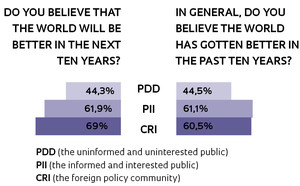 “This affirmative attitude toward the world comes from the Fernando Henrique Cardoso administration and was reaffirmed by the Lula government, which gave free rein to the optimism,” observes the researcher. This outward view does not seem to include Brazil’s Latin America neighbors, and regional identity is ambivalent. “Self-identification as Latin Americans was always tenuous among Brazilians. The perception of belonging to a nation that differs from that of its neighbors because of the distinct colonial experience, language, and particular trajectory as an independent country has always characterized the thinking of both the elite and the ordinary citizens,” says Tavares de Almeida.
“This affirmative attitude toward the world comes from the Fernando Henrique Cardoso administration and was reaffirmed by the Lula government, which gave free rein to the optimism,” observes the researcher. This outward view does not seem to include Brazil’s Latin America neighbors, and regional identity is ambivalent. “Self-identification as Latin Americans was always tenuous among Brazilians. The perception of belonging to a nation that differs from that of its neighbors because of the distinct colonial experience, language, and particular trajectory as an independent country has always characterized the thinking of both the elite and the ordinary citizens,” says Tavares de Almeida.
Recently, the professor recalls, foreign policy defined South America, rather than Latin America, as an arena for the exercise of Brazilian political leadership. According to the survey, only one-fourth of the foreign policy community acknowledges itself as Latin American, only 18.5% as South American, and the percentage of those for whom the Mercosur is an important identity is negligible (1.5%). The great majority (90%) see themselves as Brazilians.
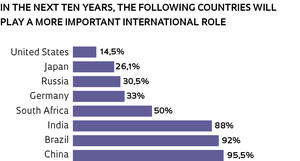 In the case of trade, this is reflected, in people’s attitudes toward the various strategies for inserting Brazil into the world economy. The CPE prefers multilateral actions within the World Trade Organization (WTO) or, secondarily, the forging of bilateral trade agreements, to the detriment of strategies involving regional coordination in the context of Mercosur or the South American vicinity. When asked which region of the world Brazil should pay most attention to, a little less than half of the CPE (48%) and an even smaller group of the PII (32.4%) said “Latin America.”
In the case of trade, this is reflected, in people’s attitudes toward the various strategies for inserting Brazil into the world economy. The CPE prefers multilateral actions within the World Trade Organization (WTO) or, secondarily, the forging of bilateral trade agreements, to the detriment of strategies involving regional coordination in the context of Mercosur or the South American vicinity. When asked which region of the world Brazil should pay most attention to, a little less than half of the CPE (48%) and an even smaller group of the PII (32.4%) said “Latin America.”
As to Brazil’s role in South America, the CPE is sharply divided: half its members say Brazil should lead by itself, while the other half says that it should share responsibility with the neighbors. The majority (55.1%) of the PII think Brazil should lead. Although they do not foresee future problems with the neighbors, Brazilians in the PII mentioned Venezuela (21%) and Colombia (24.6%) as countries with which there could be conflicts.
Regional integration, an important topic on the international agenda, is supported by 71.5% of the CPE, which wants it to be carried out comprehensively. But when researchers delved further into that sentiment, they found that trade, investments, and infrastructure are the dimensions that have significant support. These were indicated as the farthest extent to which efforts to pursue more complete integration should go. “The argument was that Mercosur was important for building a platform for cooperation precisely because of the options it provided. But the results show that for Brazil, the region is more a platform for talking to the world than an arena for maintaining dialogues or exercising a prominent role. This view is very different than what was found in the surveys taken in other countries.”
 Illustrations: Catarina BessellActually, notes Guadalupe González, for Colombia, Ecuador, or Mexico the world seems to be limited almost exclusively to the continent, where they concentrate their international aspirations and participation. Only Brazil and Peru take a more global view of their interests that encompasses other regions of the world, especially Asia, seen as a new engine of the world economy.
Illustrations: Catarina BessellActually, notes Guadalupe González, for Colombia, Ecuador, or Mexico the world seems to be limited almost exclusively to the continent, where they concentrate their international aspirations and participation. Only Brazil and Peru take a more global view of their interests that encompasses other regions of the world, especially Asia, seen as a new engine of the world economy.
Lastly, the biggest surprise coming out of the survey conducted by the IRI-USP is that the new interest in foreign affairs takes the form of a consensus between experts and the informed public. “And so, although analysts have called attention to a recent real or alleged ‘partisanization’ of foreign policy and, as a consequence, to the emergence of disputes that would indicate the loss of its character as State policy, the truth is that the consensus within the CPE and the PII is as broad as the convergence between the two groups is extensive and significant,” the professor says.
Naturally, says Tavares de Almeida, there are more controversial issues that separate the two groups but in general, despite the open criticism of government policies, the discussion has not split them. “We would need to verify this in a second sample in 2014 to confirm whether the observation is valid,” she warns.
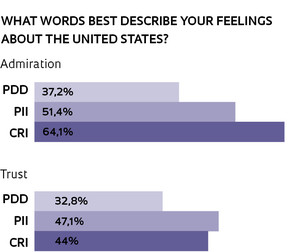 This proximity between the views of the elite and those of the informed and interested public runs contrary to what was observed in the surveys taken elsewhere in the Americas. “It indicates a greater politicization of the public that runs contrary to what traditional literature says, even if this new position is the result of perceptions generated within the foreign policy community taking root, an opinion that was formed, to some extent, exogenously,” says political scientist Janina Onuki, also from the IRI-USP and a member of the project team. “But examining that opinion enables us to understand the degree of society’s consensus about foreign policy and realize that there is a demand for greater transparency on the part of the Ministry of External Relations,” the researcher comments.
This proximity between the views of the elite and those of the informed and interested public runs contrary to what was observed in the surveys taken elsewhere in the Americas. “It indicates a greater politicization of the public that runs contrary to what traditional literature says, even if this new position is the result of perceptions generated within the foreign policy community taking root, an opinion that was formed, to some extent, exogenously,” says political scientist Janina Onuki, also from the IRI-USP and a member of the project team. “But examining that opinion enables us to understand the degree of society’s consensus about foreign policy and realize that there is a demand for greater transparency on the part of the Ministry of External Relations,” the researcher comments.
In general, whether because of its own view or the consensus with the CPE, there is an assumption that Brazil is poised to be a global actor, a natural consequence of its integration into the globalized world. “The more informed sector of the population exhibits an optimism seldom seen among those segments of the public that has fewer means of following the newscasts,” says Tavares de Almeida. “This poses a challenge for Brazilian diplomacy: to convey the optimistic feeling about international actions to a population that sees them as intangible, in the face of an economic situation that is closer to those citizens and is unsettling to them,” the professor warns.
Project
Brazil, the Americas and the World: foreign policy and public opinion 2010 (2010/06356-3); Grant mechanism Regular Line of Research Project Award; Coordinator Maria Hermínia Tavares de Almeida/USP; Investment R$242,291.24 (FAPESP).